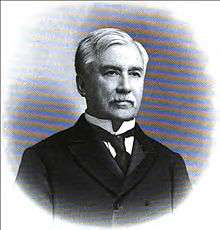William Alexander Anderson
William Alexander Anderson (May 11, 1842 – June 21, 1930) was a Virginia (USA) lawyer and politician, who served in the Virginia General Assembly and was elected twice as Attorney General of Virginia.

Student and soldier
Anderson was born in Botetourt County, Virginia, the son of Francis T. Anderson, who served on the Virginia Supreme Court and as rector of Washington & Lee University. The younger Anderson was a student at Washington College, as it was then called, when Virginia seceded in 1861, which caused him to enlist in the Confederate Army.[1] Anderson joined the "Liberty Hall Volunteers," a group of Washington College students and alumni, who "entered the war in early June 1861 as part of the Fourth Virginia Infantry Regiment under the command of Stonewall Jackson."[2] A bullet shattered Anderson's kneecap at the Battle of First Manassas.[2] The pants he was wearing, with the hole in the knee, are on display in the museum at Washington & Lee University. After the War, Anderson went to the University of Virginia Law School, graduating in 1866.[1]
Lawyer and politician
A member of the state executive committee of the Democratic Party, Anderson served in the Senate of Virginia from 1869 to 1873, and in the Virginia House of Delegates from 1883 to 1885 and from 1887 to 1889.[1] "In 1870, Anderson was credited with introducing the bill establishing the public school system of Virginia as put forth by Dr. William Henry Ruffner."[3] In 1899, he was elected president of The Virginia Bar Association.[4]
Anderson served as a member, temporary president, and revision committee Chairman of the Virginia Constitutional Convention of 1901.[1][5] He was elected Attorney General of Virginia in 1901, and re-elected in 1905.[1] Anderson and others represented Virginia in its suit against West Virginia in the United States Supreme Court, to recover a share of Virginia's public debt as of 1861.[6] When the case ended in 1920, the special commissioner recommended that Anderson be awarded $75,000.[7]
Anderson served on the Board of Trustees of Washington & Lee from 1885 to 1930,[8] and was rector from 1913 to 1924.[9]
Anderson was buried in the Stonewall Jackson Cemetery in Lexington, Virginia.
References
- Tyler, Lyon G., ed. (1907). Men of Mark in Virginia: Ideals of American Life; A Collection of Biographies of the Leading Men in the State, volume III. Men of Mark Pub. Co. (accessed via Google Books).CS1 maint: extra text: authors list (link)
- "Teacher's Guide to Lee Chapel & Museum". Lee Chapel & Museum. Retrieved March 2, 2008.
- "A Guide to the Papers of the Anderson Family, 1771-1952: Biographical/Historical Information". University of Virginia. Retrieved March 2, 2008.
- "VBA History and Heritage". The Virginia Bar Association. Archived from the original on September 27, 2007. Retrieved March 2, 2008.
- "Virginia Constitutional Convention Directory 1901". New River Notes. Retrieved March 2, 2008.
- Virginia v. West Virginia, 220 U.S. 1 (1911). The case was argued January 20, 23, 24, 25, and 26, 1911, with Anderson, Samuel W. Williams, Randolph Harrison, and John B. Moon appearing for the Commonwealth.
- "DEBT FIGHT COST MILLION.; Final Report Filed in Virginia-West Virginia Litigation" (PDF). New York Times, July 19, 1920. July 11, 1920. Retrieved March 2, 2008.
- "Washington and Lee Trustees". Washington and Lee University. Retrieved March 2, 2008.
- "Rectors and Presidents of Washington and Lee University". Washington and Lee University. Retrieved March 2, 2008.
External links
| Legal offices | ||
|---|---|---|
| Preceded by Andrew J. Montague |
Attorney General of Virginia 1902–1910 |
Succeeded by Samuel W. Williams |